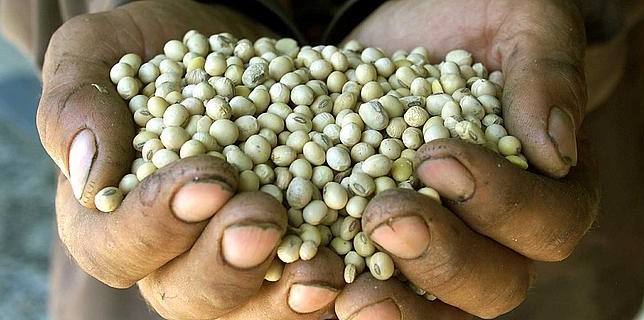The German government abstained Monday in a vote on allowing EU imports of new multi-herbicide genetically modified soybeans and thereby effectively supported the business interests of Bayer and Dow AgroSciences.

Source: www.testbiotech.org/en/node/2039
Bayer and Dow AgroSciences want the EU to approve two new genetically modified soybeans for import and usage in food and feed. Both these new soybean plants have been engineered to be resistant to three toxic herbicides known to leave residues after harvest. According to the data available, consumption of the soybeans is likely to pose health risks.
In the vote on Monday this week, the majority of EU member states voted against authorisation of the soybeans. The abstention of Germany was a decisive reason for why the vote failed to return a qualified majority. As things stand, a second vote on the import of these GM soybeans will take place in mid-September.
“Economic interests, such as those of Bayer, should not have priority over the broader interests of society,” says Christoph Then for Testbiotech. “We want the rules to be obeyed. Approval for genetically engineered plants cannot be given if the risks they pose are not sufficiently investigated.”
Testbiotech points out that the herbicides are known to leave residues after harvest, which are thought to pose significant health risks. According to the European Food Safety Authority EFSA, the existing data is not sufficient to assess the health risks. Therefore, Testbiotech is demanding that the political decision-makers reject the applications.
Testbiotech is seeing increasing political support: The Committee for the Environment at the EU Parliament recently made explicit demands for the assessment of residues from spraying GMO crops before market authorisation is granted. Further, in a letter to Testbiotech, the German Minister for the Environment, Barbara Hendricks backed demands to raise standards in the risk assessment of genetically engineered plants.
In a letter to Testbiotech and GeneWatch UK, the responsible EU Commissioner Vytenis Andriukaitis admitted in January that “it is true that the legislation requires cumulative and synergistic effects of pesticide residues to be considered,”
The pending applications concern three soybean events that have been made resistant to two or more herbicides:
- Glyphosate – which the international expert group IARC has classified as being possibly carcinogenic;
- Glufosinate – which is classified as being toxic for the reproductive system and is supposed to be removed from the market by end July 2018;
- Isoxaflutole – which is suspected by EFSA of causing cancer in humans;
- 2,4-D – which, according to recent publications, is suspected of giving rise to cancerogenic metabolites in the plants.
In the U.S., Brazil and Argentina, where the genetically engineered soybeans are cultivated, further additives are mixed into the herbicide formulations. It is known that some these additives show a higher toxicity than the single substances and are therefore no longer allowed in the EU.


















